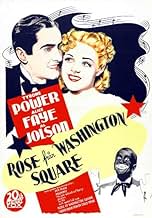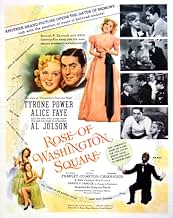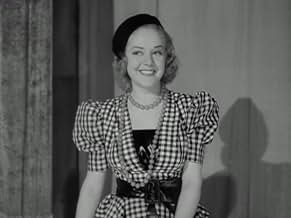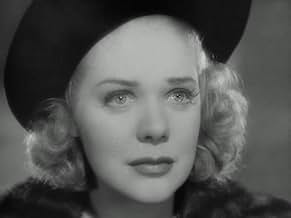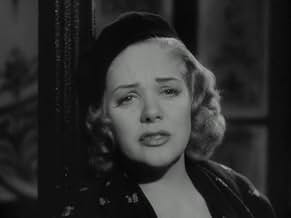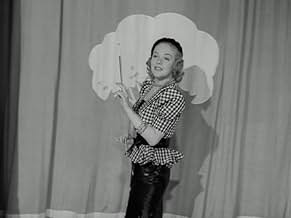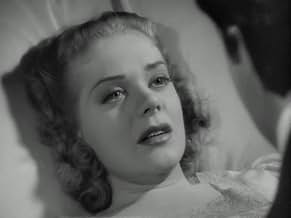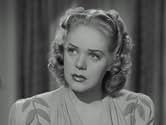Ajouter une intrigue dans votre langueA singer becomes a star in the Ziegfeld Follies, but her marriage to a con man has a bad effect on her career.A singer becomes a star in the Ziegfeld Follies, but her marriage to a con man has a bad effect on her career.A singer becomes a star in the Ziegfeld Follies, but her marriage to a con man has a bad effect on her career.
- Director
- Writers
- Stars
- Prix
- 2 victoires au total
Paul E. Burns
- Chump
- (as Paul Burns)
Horace McMahon
- Irving
- (as Horace MacMahon)
Avis en vedette
If you liked Funny Girl, and what connoisseur of musicals didn't, you'll be interested to know it wasn't the first story inspired by Fanny Brice. Rose of Washington Square is a fictional-as advertised by the disclaimer in the credits-depiction of a Ziegfeld girl who falls in love with a gambler. Sound familiar? The names are totally different, so if you weren't looking for it, you might not immediately recognize the similarity to Funny Girl. Once Alice Faye started singing "My Man," hopefully you'd figure it out.
Tyrone Power plays the scoundrel, and he and Alice have as much sizzling chemistry as they always do in their movies together. Al Jolson, who spends more of his screen time in black face than out of it, plays Alice's devoted friend. Since this was the time period without video rentals, Al pleased audiences by repeating his signature numbers "Mammy" and "California Here I Come." In the story, Al's in love with her, but since he's up against Tyrone Power, he doesn't stand a chance. It's love at first sight for Ty and Alice, and even though he's no good, albeit incredibly shrewd, she can't let him go. Barbra Streisand couldn't let Omar Sharif go, could she? Make sure to go into this movie expecting a drama.
Tyrone Power plays the scoundrel, and he and Alice have as much sizzling chemistry as they always do in their movies together. Al Jolson, who spends more of his screen time in black face than out of it, plays Alice's devoted friend. Since this was the time period without video rentals, Al pleased audiences by repeating his signature numbers "Mammy" and "California Here I Come." In the story, Al's in love with her, but since he's up against Tyrone Power, he doesn't stand a chance. It's love at first sight for Ty and Alice, and even though he's no good, albeit incredibly shrewd, she can't let him go. Barbra Streisand couldn't let Omar Sharif go, could she? Make sure to go into this movie expecting a drama.
The history of the cinema is filled with great movies; but more than that, there are special `moments,' from the great and even the not-so-great films that thanks to the magic of the movies have been preserved for all time, and now thanks to video and DVD are readily accessible for the viewing pleasure of audiences in living rooms everywhere. These movies are treasures to be cherished and savored, because they're not simply entertainment, but time capsules in which history has in some cases been inadvertently gathered and stored for posterity. And one of the jewels in this vast treasure chest that is the cinema is `Rose of Washington Square,' a 1939 picture from 20th Century Fox, filmed in glorious B&W, directed by Gregory Ratoff and starring Tyrone Power, Alice Faye and Al Jolson.
Power is Bart Clinton, a charismatic petty thief and con man whose charm and good looks keeps him one step ahead of the law as he moves from one scam to another. He's not such a bad guy, but more like a salesman without a product who utilizes his natural abilities to put a buck in his pocket. Faye is Rose Sargent, a struggling vaudeville singer, teamed up with Ted Cotter (Jolson), who together have hopes and dreams of making it to the big time. But worlds collide when Bart and Rose meet and fall in love. Ted sees Bart for what he is, but his advice to Rose falls on deaf ears, blinded as she is by her unconditional love for a man who stands in the way of not only her success as an artist, but her happiness, as well. And in the grandest tradition of Hollywood, their story plays out amid the excitement of that most famous of all avenues of aspirations, Broadway, and that town of towns, New York.
It's a good story, but with a plot that's far from unique, which in the grand scheme of things doesn't make any difference. This is solid and involving entertainment that affords the viewer the opportunity of seeing three bona fide stars together, and all doing what they do best. And just seeing them together on the screen is a moment all it's own; Power, Faye and Jolson, captured forever and immortalized through the magic of the motion picture. And at the time, who knew? To Darryl F. Zanuck this was no doubt just another picture that hopefully would produce a profitable bottom line for the studio. Did any of them have any idea what this would mean to audiences sixty years later, or what kind of legacy they were creating for future generations?
One of the best looking actors ever to grace the silver screen, Tyrone Power had a dominating presence and commanded attention in any role he played, from light, romantic fare like `Thin Ice,' to bringing the anti-hero, `Jesse James,' to life or the swashbuckling title character in `The Mark of Zorro.' He could play a heel like Bart Clinton and make him believable, or a guy soul searching for something better, as he did in `The Razor's Edge.' And if there's any doubt as to how good an actor Power was, one only has to look as far as his performance in `Nightmare Alley' to realize that he was so much more than just another pretty face. He was the man women wanted and the one other men envied because he seemed to have it all. He did; and it showed in every character he ever created for the screen.
Power, however, did not corner the market on talent and charisma in this film, but was matched every step of the way by his absolutely beguiling co-star, Alice Faye. Beautiful and gifted, Faye could sing and interpret a song in a way that was nothing less than transporting. Her vocal expressions and the emotion that dances in her eyes and plays across her face while she sings created a number of those special moments in a number of films. In this one, when she sings the heart-felt `My Man' while an incognito Power (Bart's on the lam at this point) sits huddled in the audience at the back of the auditorium, it'll grab you by the throat and send chills down your spine. And that is truly one of those memorable `Moments' that have made movies such an everlasting part of our lives and culture. When Faye turns those eyes of hers, fraught with emotion, to the camera as she sings, it's mesmerizing-- a moment that will hold you transfixed and sweep you away to another time and another place.
Which is exactly what happens when Al Jolson takes the spotlight as Ted Cotter. Jolson was perhaps the entertainer of his time, a man who entertained millions from the footlights of the most famous stages around the world. And what a treasure it is to have even part of his act preserved here on film. Some of the songs he made famous, like `Rock-a-bye-Your-Baby With A Dixie Melody,' and the one that became his trademark, `Mammy,' are seamlessly integrated into this story. Although this kind of entertainment may not be readily embraced by younger viewers-- those raised on hard rock and grunge, for example-- there is a magic in Jolson and his songs that defines an era, and with his unique voice and magnetic personality, it is riveting to watch him now in this film.
The supporting cast includes William Frawley (Harry), Joyce Compton (Peggy), Hobart Cavanaugh (Whitey), Louis Prima (Bandleader), Horace McMahon (Irving) and Moroni Olsen (Buck). It may not be the greatest musical-- or movie-- ever made, but nevertheless, `Rose of Washington Square' is a treasure, for all the reasons discussed here and more. It's a film that will be enjoyed and appreciated on any number of different levels by anyone who watches it; pure entertainment, with a particular magic all it's own. This one's a keeper. It's the magic of the movies. I rate this one 9/10.
Power is Bart Clinton, a charismatic petty thief and con man whose charm and good looks keeps him one step ahead of the law as he moves from one scam to another. He's not such a bad guy, but more like a salesman without a product who utilizes his natural abilities to put a buck in his pocket. Faye is Rose Sargent, a struggling vaudeville singer, teamed up with Ted Cotter (Jolson), who together have hopes and dreams of making it to the big time. But worlds collide when Bart and Rose meet and fall in love. Ted sees Bart for what he is, but his advice to Rose falls on deaf ears, blinded as she is by her unconditional love for a man who stands in the way of not only her success as an artist, but her happiness, as well. And in the grandest tradition of Hollywood, their story plays out amid the excitement of that most famous of all avenues of aspirations, Broadway, and that town of towns, New York.
It's a good story, but with a plot that's far from unique, which in the grand scheme of things doesn't make any difference. This is solid and involving entertainment that affords the viewer the opportunity of seeing three bona fide stars together, and all doing what they do best. And just seeing them together on the screen is a moment all it's own; Power, Faye and Jolson, captured forever and immortalized through the magic of the motion picture. And at the time, who knew? To Darryl F. Zanuck this was no doubt just another picture that hopefully would produce a profitable bottom line for the studio. Did any of them have any idea what this would mean to audiences sixty years later, or what kind of legacy they were creating for future generations?
One of the best looking actors ever to grace the silver screen, Tyrone Power had a dominating presence and commanded attention in any role he played, from light, romantic fare like `Thin Ice,' to bringing the anti-hero, `Jesse James,' to life or the swashbuckling title character in `The Mark of Zorro.' He could play a heel like Bart Clinton and make him believable, or a guy soul searching for something better, as he did in `The Razor's Edge.' And if there's any doubt as to how good an actor Power was, one only has to look as far as his performance in `Nightmare Alley' to realize that he was so much more than just another pretty face. He was the man women wanted and the one other men envied because he seemed to have it all. He did; and it showed in every character he ever created for the screen.
Power, however, did not corner the market on talent and charisma in this film, but was matched every step of the way by his absolutely beguiling co-star, Alice Faye. Beautiful and gifted, Faye could sing and interpret a song in a way that was nothing less than transporting. Her vocal expressions and the emotion that dances in her eyes and plays across her face while she sings created a number of those special moments in a number of films. In this one, when she sings the heart-felt `My Man' while an incognito Power (Bart's on the lam at this point) sits huddled in the audience at the back of the auditorium, it'll grab you by the throat and send chills down your spine. And that is truly one of those memorable `Moments' that have made movies such an everlasting part of our lives and culture. When Faye turns those eyes of hers, fraught with emotion, to the camera as she sings, it's mesmerizing-- a moment that will hold you transfixed and sweep you away to another time and another place.
Which is exactly what happens when Al Jolson takes the spotlight as Ted Cotter. Jolson was perhaps the entertainer of his time, a man who entertained millions from the footlights of the most famous stages around the world. And what a treasure it is to have even part of his act preserved here on film. Some of the songs he made famous, like `Rock-a-bye-Your-Baby With A Dixie Melody,' and the one that became his trademark, `Mammy,' are seamlessly integrated into this story. Although this kind of entertainment may not be readily embraced by younger viewers-- those raised on hard rock and grunge, for example-- there is a magic in Jolson and his songs that defines an era, and with his unique voice and magnetic personality, it is riveting to watch him now in this film.
The supporting cast includes William Frawley (Harry), Joyce Compton (Peggy), Hobart Cavanaugh (Whitey), Louis Prima (Bandleader), Horace McMahon (Irving) and Moroni Olsen (Buck). It may not be the greatest musical-- or movie-- ever made, but nevertheless, `Rose of Washington Square' is a treasure, for all the reasons discussed here and more. It's a film that will be enjoyed and appreciated on any number of different levels by anyone who watches it; pure entertainment, with a particular magic all it's own. This one's a keeper. It's the magic of the movies. I rate this one 9/10.
Despite this disclaimer at the beginning of "Rose of Washington Square," Fanny Brice realized the film was about her and quickly sued 20th Century Fox.
Gee, wonder what the kicker was...the good-looking con man husband who goes to jail on a bond fraud? The lead character headlining with the Ziegfield Follies? Or was it the song "My Man"?
Alice Faye is very pretty as Rose in this somewhat politically incorrect film which also stars Tyrone Power and Al Jolson: There's the man who is paid to drink so he can heckle Al Jolson as part of his act, and there's Al himself in blackface with white lips up on stage singing.
Nevertheless, the real story concerns the codependent relationship between Rose and Bart, her crooked husband. But it's Tyrone Power, and what woman wouldn't have loved him - in fact, what woman didn't love him in 1939? He was the number 2 box office star. He portrays the likable but sleazy character very well.
In the beginning of his career a few years earlier, he did romantic comedy, then did a string of films where he was a cad, then played soldiers, and after the war, did everything - he was a young man who found himself in "The Razor's Edge," played against type in "Nightmare Alley," and period-pieced his way through Fox until his contract finally ended. In 22 years as a star, he really did every genre, and did them beautifully.
There's lots of music in this movie and a HUGE build-up to the song "My Man" before Faye ever sings it. When she does, it's not the Streisand version, but rather a torch song, sung in Faye's low, rich voice.
Jolson was a terrific performer though apparently extremely egomaniacal and difficult to work with. He sings his standards: "Mammy," "California Here I Come," "Toot-toot-Tootsie," "Rockabye Your Baby," etc., and he's great.
Power and Faye make a wonderful couple. And by the way, they shared the same birthday, a year apart.
This is an okay film - but it's no Alexander's Ragtime Band, which is far superior.
Gee, wonder what the kicker was...the good-looking con man husband who goes to jail on a bond fraud? The lead character headlining with the Ziegfield Follies? Or was it the song "My Man"?
Alice Faye is very pretty as Rose in this somewhat politically incorrect film which also stars Tyrone Power and Al Jolson: There's the man who is paid to drink so he can heckle Al Jolson as part of his act, and there's Al himself in blackface with white lips up on stage singing.
Nevertheless, the real story concerns the codependent relationship between Rose and Bart, her crooked husband. But it's Tyrone Power, and what woman wouldn't have loved him - in fact, what woman didn't love him in 1939? He was the number 2 box office star. He portrays the likable but sleazy character very well.
In the beginning of his career a few years earlier, he did romantic comedy, then did a string of films where he was a cad, then played soldiers, and after the war, did everything - he was a young man who found himself in "The Razor's Edge," played against type in "Nightmare Alley," and period-pieced his way through Fox until his contract finally ended. In 22 years as a star, he really did every genre, and did them beautifully.
There's lots of music in this movie and a HUGE build-up to the song "My Man" before Faye ever sings it. When she does, it's not the Streisand version, but rather a torch song, sung in Faye's low, rich voice.
Jolson was a terrific performer though apparently extremely egomaniacal and difficult to work with. He sings his standards: "Mammy," "California Here I Come," "Toot-toot-Tootsie," "Rockabye Your Baby," etc., and he's great.
Power and Faye make a wonderful couple. And by the way, they shared the same birthday, a year apart.
This is an okay film - but it's no Alexander's Ragtime Band, which is far superior.
ROSE OF WASHINGTON SQUARE (20th Century-Fox, 1939), directed by Gregory Ratoff, a nostalgic musical, is a worthy follow-up to Fox's previous success, ALEXANDER'S RANGTIME BAND (1938), both starring the up-and-coming Tyrone Power and Alice Faye, making their third and final screen appearance together (their initial being IN OLD CHICAGO in 1937). While this production belongs to Alice Faye and Tyrone Power in that order, it's Al Jolson, assuming third billing in a secondary role, who comes off best. His fine acting and song delivery remain the film's major asset, which makes one wish he were given more to do. ROSE OF WASHINGTON SQUARE is also the most musical of all the Jolson, as well as Faye films.
In a story that opens circa 1919, Ted Cotter (Al Jolson) and Rose Sargent (Alice Faye) partners who specialize in singing, struggling to achieve success, are both working separately, he in a burlesque house singing while passing out theater programs, and she at amateur nights singing for nickels and dimes tossed to her. Disappointed, Rose breaks away from theater life to a Long Island resort accompanied by her friend, Peggy (Joyce Compton). While there she encounters Barton DeWitt Clinton (Tyrone Power), a handsome war veteran who happens to be a petty thief. A smooth operator, Clinton immediately wins Rose's affections. After his latest theft involving an expensive stolen necklace backfires, and under the watchful eye of Detective Mike (Charles C. Wilson), Clinton quickly leaves without any notice to Rose. In the meantime, Harry Long (William Frawley), a booking agent, has arranged for Ted to appear in a tryout. Thanks to the unintentional interruptions by the intoxicated loud-mouth patron (Hobart Cavanaugh) sitting up in the box, the act proves favorable and hired to boost up attendance. successful. As for Rose, she's singing in a basement speakeasies until she she once again encounters Clinton who saves her from a police raid. This time the two become inseparable and eventually marry, much to the dismay of Ted, who sees through Clinton for what he really is, but agrees to remain neutral for Rosie's sake. After Rose achieves her long delayed success in the Ziegfeld Follies, her personal life turns to heartache as Clinton, in desperate need of money, gets himself deeper and deeper in debt, leading to arrest and prison term.
With a handful of old-time Broadway songs from the 1920s era, Alice Faye sings them in her usual manner, although several of them, including "My Man," are reportedly long associated with the legendary Fanny Brice. As for Al Jolson, he reprises many of his most celebrated hits in his traditional black-face manner. He is one for the memory book of legendary bygone entertainers. The musical program includes: "Pretty Baby" (sung by Al Jolson); "I'm Sorry I Made You Cry" (sung by Alice Faye); "Ja-Da" and "Vamp" (both sung by Faye); "Rock-a-Bye Your Baby With A Dixie Melody" and "Toot-Toot Tootsie, Goodbye" (both sung by Jolson); "I'm Just Wild About Harry" (Alice Faye); "California, Here I Come" (Al Jolson); "I Never Knew Heaven Could Speak" and "Rose of Washington Square" (both sung by Faye); "Mammy" (Al Jolson); "My Man" and "My Man" (reprise, both sung by Faye). While the majority of the tunes are mainly sung by the principal players, with the camera giving them full focus, only the title tune is given the full production number treatment running nearly ten minutes.
Also seen in the cast are: Moroni Olson playing Buck Russell; E.E. Clive, Louis Prima, Ben Weldon, Harry Hayden, Charles Lane and John Hamilton.
According to an well documented, "HIDDEN Hollywood: FROM THE VAULTS OF 20th CENTURY-FOX" narrated by Joan Collins, which premiered on American Movie Classics in 1997, ROSE OF WASHINGTON SQUARE was originally planned as a two hour presentation, but was then cut to 86 minutes. Included in this documentary are numerous outtakes, featuring Jolson's rendition of "April Showers" and "Avalon," and Alice Faye's version to the film's theme song, "I'm Always Chasing Rainbows." Another added bonus was the guest appearances of the comedy team of Weber and Fields doing a stage act, as observed in the audience by Jolson and William Frawley. It's also been noted somewhere that actress Winifred Harris appeared as Broadway legend Lillian Russell (a role Alice Faye would portray in 1940), whose scenes were also cut. The documentary does explain as to why certain scenes didn't make it to the final print. As with other 20th Century-Fox musicals attempting to recapture the days of old Broadway, ROSE OF WASHINGTON SQUARE is historically inaccurate in the hairstyle and fashion department being 1939 modern. Although the opening titles credit this movie to be entirely fiction, there's no doubt that it's suggested on the career of Fanny Brice.
In spite of these shortcomings, ROSE OF WASHINGTON SQUARE, as a musical, is entertaining as well as involving in plot. As mentioned before, Al Jolson nearly steals the limelight from his leading players. Sadly, this would mark an end of a era for this legendary singer whose legacy remains with THE JAZZ SINGER (Warner Brothers, 1927),Hollywood's "first talkie," while Power and Faye would continue their fame and fortune for the duration of their careers.
ROSE OF WASHINGTON SQUARE, distributed to home video in the 1990s, unseen on cable TV since it's American Movie Classic days, made its Turner Classic Movies premiere May 5, 2013. The home video edition contains "April Showers" and "Avalon" outtakes, along with its theatrical trailer. Of her musicals, ROSE OF WASHINGTON SQUARE has become one of the most remembered and admired of all her movies. (***)
In a story that opens circa 1919, Ted Cotter (Al Jolson) and Rose Sargent (Alice Faye) partners who specialize in singing, struggling to achieve success, are both working separately, he in a burlesque house singing while passing out theater programs, and she at amateur nights singing for nickels and dimes tossed to her. Disappointed, Rose breaks away from theater life to a Long Island resort accompanied by her friend, Peggy (Joyce Compton). While there she encounters Barton DeWitt Clinton (Tyrone Power), a handsome war veteran who happens to be a petty thief. A smooth operator, Clinton immediately wins Rose's affections. After his latest theft involving an expensive stolen necklace backfires, and under the watchful eye of Detective Mike (Charles C. Wilson), Clinton quickly leaves without any notice to Rose. In the meantime, Harry Long (William Frawley), a booking agent, has arranged for Ted to appear in a tryout. Thanks to the unintentional interruptions by the intoxicated loud-mouth patron (Hobart Cavanaugh) sitting up in the box, the act proves favorable and hired to boost up attendance. successful. As for Rose, she's singing in a basement speakeasies until she she once again encounters Clinton who saves her from a police raid. This time the two become inseparable and eventually marry, much to the dismay of Ted, who sees through Clinton for what he really is, but agrees to remain neutral for Rosie's sake. After Rose achieves her long delayed success in the Ziegfeld Follies, her personal life turns to heartache as Clinton, in desperate need of money, gets himself deeper and deeper in debt, leading to arrest and prison term.
With a handful of old-time Broadway songs from the 1920s era, Alice Faye sings them in her usual manner, although several of them, including "My Man," are reportedly long associated with the legendary Fanny Brice. As for Al Jolson, he reprises many of his most celebrated hits in his traditional black-face manner. He is one for the memory book of legendary bygone entertainers. The musical program includes: "Pretty Baby" (sung by Al Jolson); "I'm Sorry I Made You Cry" (sung by Alice Faye); "Ja-Da" and "Vamp" (both sung by Faye); "Rock-a-Bye Your Baby With A Dixie Melody" and "Toot-Toot Tootsie, Goodbye" (both sung by Jolson); "I'm Just Wild About Harry" (Alice Faye); "California, Here I Come" (Al Jolson); "I Never Knew Heaven Could Speak" and "Rose of Washington Square" (both sung by Faye); "Mammy" (Al Jolson); "My Man" and "My Man" (reprise, both sung by Faye). While the majority of the tunes are mainly sung by the principal players, with the camera giving them full focus, only the title tune is given the full production number treatment running nearly ten minutes.
Also seen in the cast are: Moroni Olson playing Buck Russell; E.E. Clive, Louis Prima, Ben Weldon, Harry Hayden, Charles Lane and John Hamilton.
According to an well documented, "HIDDEN Hollywood: FROM THE VAULTS OF 20th CENTURY-FOX" narrated by Joan Collins, which premiered on American Movie Classics in 1997, ROSE OF WASHINGTON SQUARE was originally planned as a two hour presentation, but was then cut to 86 minutes. Included in this documentary are numerous outtakes, featuring Jolson's rendition of "April Showers" and "Avalon," and Alice Faye's version to the film's theme song, "I'm Always Chasing Rainbows." Another added bonus was the guest appearances of the comedy team of Weber and Fields doing a stage act, as observed in the audience by Jolson and William Frawley. It's also been noted somewhere that actress Winifred Harris appeared as Broadway legend Lillian Russell (a role Alice Faye would portray in 1940), whose scenes were also cut. The documentary does explain as to why certain scenes didn't make it to the final print. As with other 20th Century-Fox musicals attempting to recapture the days of old Broadway, ROSE OF WASHINGTON SQUARE is historically inaccurate in the hairstyle and fashion department being 1939 modern. Although the opening titles credit this movie to be entirely fiction, there's no doubt that it's suggested on the career of Fanny Brice.
In spite of these shortcomings, ROSE OF WASHINGTON SQUARE, as a musical, is entertaining as well as involving in plot. As mentioned before, Al Jolson nearly steals the limelight from his leading players. Sadly, this would mark an end of a era for this legendary singer whose legacy remains with THE JAZZ SINGER (Warner Brothers, 1927),Hollywood's "first talkie," while Power and Faye would continue their fame and fortune for the duration of their careers.
ROSE OF WASHINGTON SQUARE, distributed to home video in the 1990s, unseen on cable TV since it's American Movie Classic days, made its Turner Classic Movies premiere May 5, 2013. The home video edition contains "April Showers" and "Avalon" outtakes, along with its theatrical trailer. Of her musicals, ROSE OF WASHINGTON SQUARE has become one of the most remembered and admired of all her movies. (***)
Very entertaining- a thinly disguised bio-pic of Fanny Brice. Power and Faye- at their acting peaks- are great as the leads. Faye is in great voice. However, Jolson steals the movie. At the age of 54, he was in the best voice of his career. His Rock- a Bye and California Here I Come are thrilling. I own the video, which also contains clips of several Jolson and Faye songs which were edited out of the final movie. a must for fans of the three stars.
Le saviez-vous
- AnecdotesThis film closely resembles the life of entertainer Fanny Brice, and Alice Faye even sings Brice's signature song, "My Man" in the film. According to Alice Faye: The Star Next Door (1996), Brice and her second husband, Nicky Arnstein, sued 20th Century Fox for $750,000. The studio benefited from the publicity generated by the lawsuit - the film became the highest grossing musical of 1939 - and eventually settled out of court with both: Arnstein accepted $25,000, while Brice demanded considerably more and agreed to an undisclosed amount.
- Citations
Barton Dewitt Clinton: You know, I wish you were in some kind of trouble.
Rose Sargent: But why?
Barton Dewitt Clinton: Just so that I could get you out of it.
- Autres versionsThey cut out Alice Faye singing "Chasing Rainbows" from the film, but it is on the DVD.
- ConnexionsFeatured in Take It or Leave It (1944)
Meilleurs choix
Connectez-vous pour évaluer et surveiller les recommandations personnalisées
Détails
- Date de sortie
- Pays d’origine
- Langue
- Aussi connu sous le nom de
- Roža velemesta
- Lieux de tournage
- société de production
- Consultez plus de crédits d'entreprise sur IMDbPro
- Durée1 heure 26 minutes
- Couleur
- Rapport de forme
- 1.37 : 1
Contribuer à cette page
Suggérer une modification ou ajouter du contenu manquant

Lacune principale
By what name was Rose of Washington Square (1939) officially released in Canada in English?
Répondre
